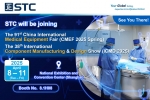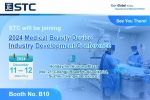
CHEMICAL
Characterization for materials used in medical devices – an analysis of a material’s composition, purity, uniformity, sterilant residuals and extractables – is an essential step to verify their suitability for human body contact, thus should not be missed out throughout the product life cycle.
Following the enforcement of RoHS 2 in the European Union, which restricts the use of specified hazardous substances in electrical and electronic equipment, and medical devices are now added to the scope of the Directive and have to be verified as RoHS-compliant.
The chemical laboratory at STC is equipped with the most advanced testing equipment; our team of experts can perform material characterization and RoHS analysis with a wide range of testing methods. We can help manufacturers identify the appropriate testing program based on the intended use of a device and material, and its expected nature of contact with the human body.
Material Characterization - Guidelines & Standards
- U.S. FDA Blue Book Memorandum GP#95-1
- ISO 10993-1, “Biological Evaluation of Medical Devices”
- ISO 10993-18, “Chemical Characterization of Materials”
- FDA Guidance Document, “Container Closure Systems for Packaging Human Drugs and Biologics”
Material Characterization Testing Capabilities
- Physiochemical Test
- Fourier Transform Infrared Spectroscopy (FTIR)
- High-Performance Liquid Chromatography/mass Spectrometry (HPLC-MS)
- Gas Chromatography / Flame Ionization Detector (GC / FID)
- Gas Chromatography / Mass Spectrometry (GC / MS)
- Inductively Coupled Plasma Spectrometry (ICP)
- Specific Gravity
- Gel-Permeation Chromatography (GPC)
- Viscosity
- Differential Scanning Calorimetry (DSC)
For more information about our Chemical Testing services, please feel free to contact us.
OTHER TESTING SERVICES


















